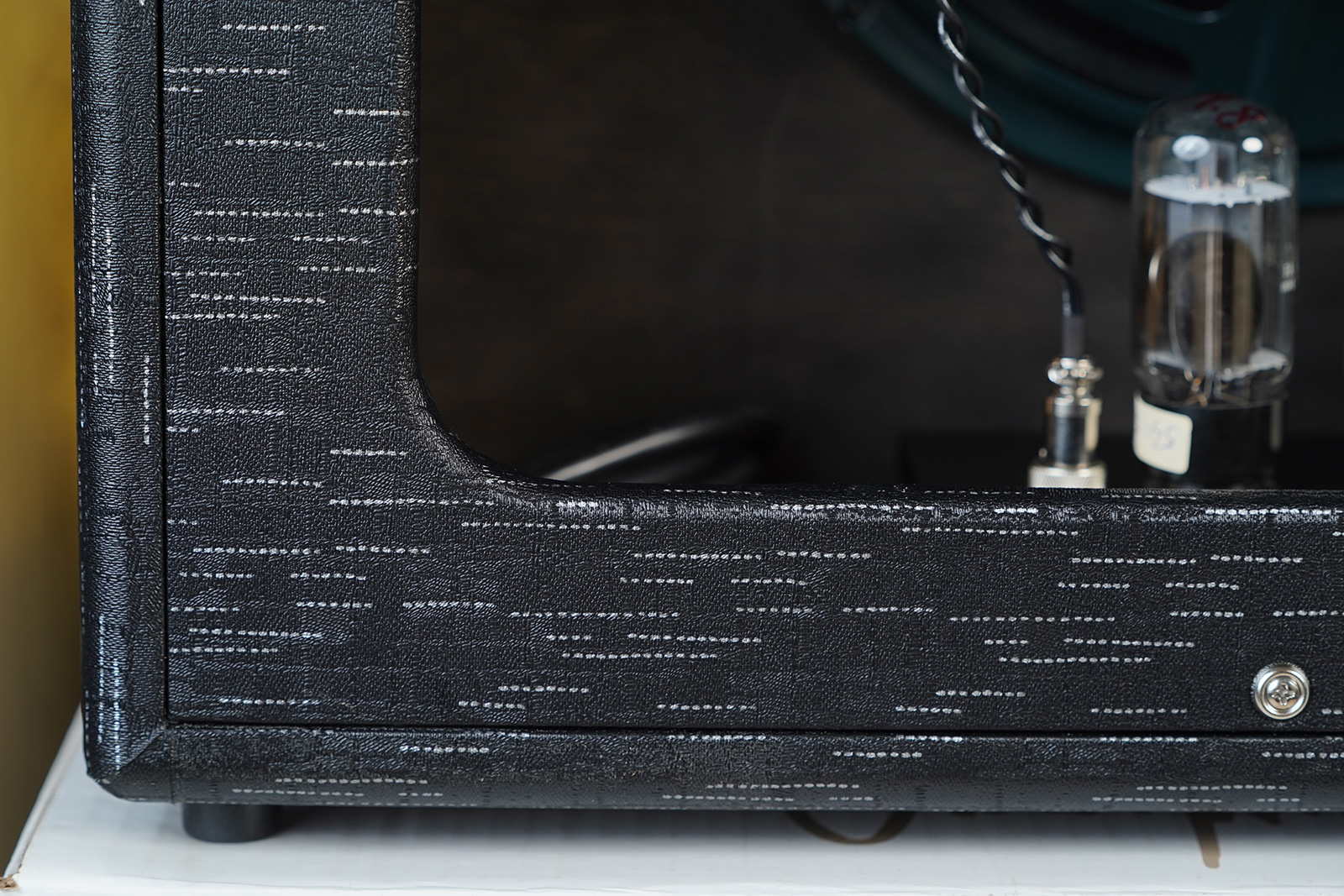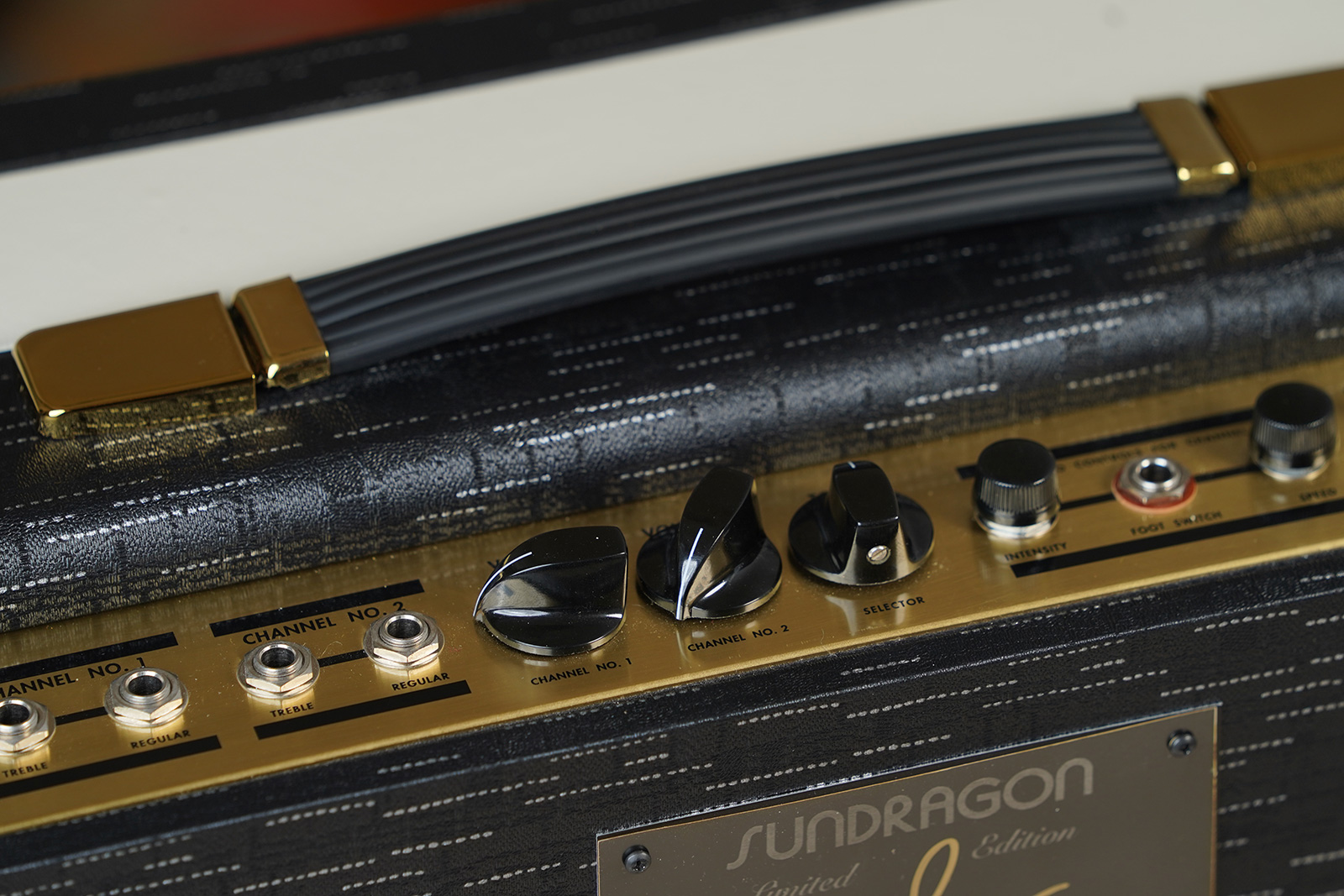Amps and effects
Sundragon Limited Edition #18/50 signed by Jimmy Page
34.500 €

If one sound were to sum up the rock of the second half of the 20th century, it would undoubtedly be Led Zeppelin. Unique in its ferocious power, its unleashed rhythm and its psychedelic incursions, the sound displayed on the band's eponymous first album is a tidal wave overturning everything that was known at the time. Jimmy Page was a mad experimenter, crafting an unmistakable sonic identity that made the sound of the future of music. This Sundragron amp is the result of a unique collaboration with Jimmy Page, faithfully reproducing the amp the guitarist used to create the revolutionary sound of Led Zeppelin 1 and other legendary records.
To celebrate Led Zeppelin's 50th anniversary, Jimmy Page teamed up with Perry Margouleff and Mitch Colby to create an extraordinary amplifier. The result is the Sundragon, an amp that offers all guitarists the opportunity to enjoy the unique sounds he created to shape the future of rock and roll. This is a limited edition of 50 handcrafted Sundragons, all of which are signed on a plate attached to the back of the amplifier.
Jimmy Page's original amp has a storied history that shaped his legend. While on tour with Neil Christian, the Supro Coronado fell out of the band's van. Attached to this amp, the guitarist had it thoroughly restored and modified, obtaining a unique and revolutionary sound palette. After nearly half a century of mystery, Jimmy Page decided to give the world the secrets of this groundbreaking amplifier. He was impressed with the forensic analysis conducted by Perry Margouleff and Mitch Colby in researching the sound reproduction of the original Supro amp. This Sundragon is therefore the most faithful reproduction of the great sound created by Jimmy Page, which changed the history of music. Just plug in the jack... and the golden age of rock and roll is reborn!
Other photos
Jimmy Page
(1944)
Band: Led Zeppelin
Main guitar: Gibson Les Paul Standard 1959
Compulsory listening: What Is And What Should Never Be
The wizard and the sex symbol. As the guitar player in Led Zeppelin, Page has created the quintessential guitar hero cliché, the one every soloist from the seventies ripped off. The long hair that hid his eyes, the tight dragon pants, the low-slung Les Paul… Page was already charismatic and mysterious with only a guitar in his hand, but when he was performing dark rituals with his bow and theremin, his competitors didn’t stand a chance.
Led Zeppelin was far from James Patrick Page’s first draft: he was one of the most in-demand studio musicians in London during the swinging sixties, playing on albums by many artists including Tom Jones, The Who or even Johnny Hallyday. By the end of the decade, he joined the band The Yardbirds and ended up replacing Jeff Beck, before compltely taking over and creating the New Yardbirds. John Paul Jones was brought in on bass (he also was a studio musician and had played with Page many times before), and Page picked Robert Plant (a young amateur singer from the North) and John Bonham (the drummer from Plant’s band). A few months later, the band was renamed Led Zeppelin and they got on the road in Europe and America to conquer the world with gargantuan riffs, psychedelic freakouts and Chicago blues inspired lyrics.
Page recorded the 1969 debut album with a 1959 rosewood Telecaster, then he bought a Les Paul Burst from Joe Walsh and finally found his sonic truth. Riffs like Whole Lotta Love and Bring It On Home would never have sounded so vicious and fat if the divine Gibson had not originated them. Led Zeppelin II made the band absolutely huge and they kept on convincing new fans all the time by not playing the rules of music business: no singles, no TV appearances, no good reviews of the album. Critics would of course end up swallowing their pride by acknowledging they couldn’t understand what a few millions fans had seen in them.
The band broke up after Bonham’s tragic death in 1980. Page took five years to put a new band back together, The Firm with Paul Rodgers on vocals. He then released his solo album Outrider in 1988 and collaborated with David Coverdale in 1993. Outrider almost sounds like a tribute to Led Zeppelin, and so in 1994 the old magic was conjured again. Page & Plant made No Quarter, where they revisit Zep classics with an Egyptian orchestra. Walking Into Clarksdale was not as powerful, and after that Page stopped working on albums of original material. He collaborated with the Black Crowes for a live record of Zeppelin songs, and as of now seems to fully focus his energy on the band’s heritage, from reissues to remasters. One could hardly blame him with such a gold mine at his disposal.


















